Highlights
Key Specs
Wi-Fi Range7500 square feetWi-Fi Mesh SystemYesNumber of Wi-Fi Satellites Included3Wi-Fi Speed4.3 gigabits per secondWorks WithAmazon Alexa
General
Product NameMax 7 BE20800 Tri-Band Mesh Wi-Fi 7 System (3-pack)BrandeeroModel NumberV010311ColorWhiteColor CategoryWhite
Security
Data EncryptionYesEncryption TypeWPA2-Personal, WPA3-PersonalFirewall TypeNone
Network
Quality Of Service (QoS) Traffic PrioritizationNoBand TechnologyTriEthernet Standard10/100/1000/2500/10000Number Of Connected Devices200Frequency Band2.4 GHz, 5.0 GHz, 6.0 GHz, Not ApplicableWireless Networking StandardWi-Fi 7Wireless StandardBEWi-Fi Range7500 square feetInput/Output TechnologyMIMO (Multiple-Input Multiple Output)Number of 2.4Ghz Streams2Number of 5.0Ghz Streams4Number of 6.0Ghz Streams4Wi-Fi Mesh SystemYesNumber of Wi-Fi Satellites Included3Number of Wi-Fi Satellites Supported32Wired BackhaulYes
Certifications & Listings
ENERGY STAR CertifiedNo
Features
App CompatibleYesApp NameeeroIntegrated ModemNoWirelessYes
Ports
Port Type(s)RJ-45, None
Speed
Wired Speed10000 megabits per secondWi-Fi Speed4.3 gigabits per secondGigabit Ethernet SpeedYes
Compatibility
Works WithAmazon Alexa
Dimension
Product Height3.54 inchesProduct Length7.24 inchesProduct Width8.74 inchesProduct Weight2.97 pounds
Warranty
Manufacturer's Warranty - Parts1 yearManufacturer's Warranty - Labor1 year
Other
UPC840268932336
With two 10 GbE ports and Wi-Fi 7 technology, eero max 7 can provide more than twice the speed of Wi-Fi 6. This isn't a minor upgrade, this is a whole new level of fast.
The power of Wi-Fi 7 technology.
Wi-Fi 7 technology can provide more than twice the speed of Wi-Fi 6, so you can enjoy lower latency, increased capacity, and more efficiency on your network.
The speed of eero Max 7.
With two 10 GbE ports, you can enjoy wired speeds up to 9.4 Gbps, wireless speeds up to 4.3 Gbps, and multi-gig backhaul speeds - making your network seriously fast.
More coverage, more devices.
eero Max 7 supports additional wifi bandwidth on the 320 MHz radio channel. Supports up to 7,500 sq. ft. and 200+ devices.
TrueMesh reliability
Our patented TrueMesh network intelligence dynamically finds the ideal path for data transfer, limiting interference and helping ensure fast, reliable internet.
Level up your game.
eero Max 7 with Wi-Fi 7 technology helps deliver ultra high performance gaming, ideal for applications that require high throughput and low latency.
Search
- A: AnswerYou will experience wired network speeds up to 9.4 Gbps and wireless network speeds up to 4.3 Gbps. This is eero’s first device with Wi-Fi 7 technology that can provide more than twice the speed of Wi-Fi 6. It supports 200+ connected devices and provides up to 7,500 sq. ft. of coverage. It is backward-compatible with previous-generation eero devices.
Answered by Anonymous
Q: QuestionDo all three of the Eero Max 7's have the four hard wire connection ports?(1 answer)
A: AnswerYes, all Max 7 will have four ethernet ports. We do not make a version of the Max 7 without ethernet ports.Answered by eeroinc Team
eero - Max 7 BE20800 Tri-Band Mesh Wi-Fi 7 System (3-pack) - White
Series:
Number of Wi-Fi Satellites Included:
Wireless Networking Standard:
Shipping
Have everything you need?
See other items that work well with this one.

- Plus

- Plus

- Plus

Reviews
Rating 4.4 out of 5 stars with 18 reviews
4.4Rating by feature
- 4.8Setup
Rating 4.8 out of 5 stars
- 4.4Range
Rating 4.4 out of 5 stars
- 4.5Signal Strength
Rating 4.5 out of 5 stars
3 expert reviews
The vast majority of our reviews come from verified purchases. Reviews from customers may include My Best Buy members, employees, and Tech Insider Network members (as tagged). Select reviewers may receive discounted products, promotional considerations or entries into drawings for honest, helpful reviews.
Rated 5 out of 5 stars
Best Eero Mesh at this point.
I give it 5 stars because I do think at this point this is the best Eero mesh system, the speeds are much faster, larger coverage, and 3 pack pretty much covers my entire house of over 3000 sq ft. Previously I had Eero Pro 6, and 5 pack of them did a decent job, but with 3 pack of Eero Max 7 now I’m seeing two times faster speeds. I do have a WiFi 7 device, while connectivity is always steady, but speeds are less than 6e/6 results.
Posted by NYQ83
Rated 5 out of 5 stars
Expensive but excellent
I've gravitated toward Eero products for the past few years thanks to their ease of use while offering good set-and forget wifi performance. I am on gigabit fiber and I used a 3-pack of Eero pro 6 for the last 2 years with great reliability. The pro 6 gave me around 300-600mbps download speeds depending on location. My ISP recently offered 2 gig speed at a reasonable price and being the tech guy I am I decided to jump on it. I replaced my Eero pro 6's with these max 7's and I now get 600-1500mbps depending on location, and thats only on 6 or 6E devices. Once we get some native wifi 7 devices, we should see even faster speed. I also really appreciate the 2 10gb ports and the 2 2.5gb ports. Finally we have an Eero wifi device with ample wired options. You can have the satellite units (which are technically identical to the main router) wired or wireless. If you use wired ethernet to connect the other units, make sure you wire the other two units "downstream" of the main router unit. As with previous Eero products, these are very, very easy to set up. They use an app for everything and it uses the amazon cloud to provide continual data about your network that works the same regardless of if you're at home or not. You can see how much data each device is using and set various parental controls if desired. The app is well designed and easy to use. There aren't as many advanced wifi options as some expert users might want, but for those who want an easy option that works well, Eero is great. They are incredibly reliable and the max 7 appears to be no different. My main complaint about Eero systems have to do with the subscription to Eero plus. I used to have a $3/month one from them that provided extra functionality such as ad-blocking and other protections as well as more detailed data consumption and analytics. They had a $10/month tier as well which adds things such as 1password and a VPN service. Sadly, Eero discontinued the $3 tier and you now have to pay the $10/month even if you never want to use 1password or the other services. I wish Eero would bring back a cheaper subscription tier which doesn't have the extra services most won't use. For most users, the max 7 is overkill. If you have gig speeds or less, the pro 6 or pro 6e is good at a much lower price. But for those with a super fast fiber connection looking for an easy to use friendly app based wifi system, look no further.
Posted by Cody
Rated 5 out of 5 stars
Solid as always
We ugraded from eero pro 6 to eero max 7 and the results are incredible. We have 115 online devices and my son likes to play games on play station, xbox, and gaming pc. We have all three eeros hard wired and i am getting on my iphone 15 pro 940 download and 925 upload speeds wirelessly. Our hard wired devices are getting 980 download and 980 upload. We have AT&T fiber 1000 plan. I had tried the Netvear 973 but i prefer eero beciase the app is better and eero only charges $100 for the eero plus which is a must better deal than the cost of all of netgears packages which you have to pay for after one year continued support, security software, and child monitoring which all total comes out to being well more than $100 yearly. We have been with eero from 2018 with our first mesh system the eero pro 5. We did try the eero pro 6e but that system had lots of issues so we returned it. We had been waiting for the eero max 7 since it was announced back in the summer. You won’t be disappointed amd the ease to set up and headache free. Eero has finally returned back to being a solid system less the eero pro 6e which i had heard from the pandemic did not have all the quality components eeeo had been known to contain. I am so thankful eero returned to excellence. Way to go eero.
Posted by ScottieD












